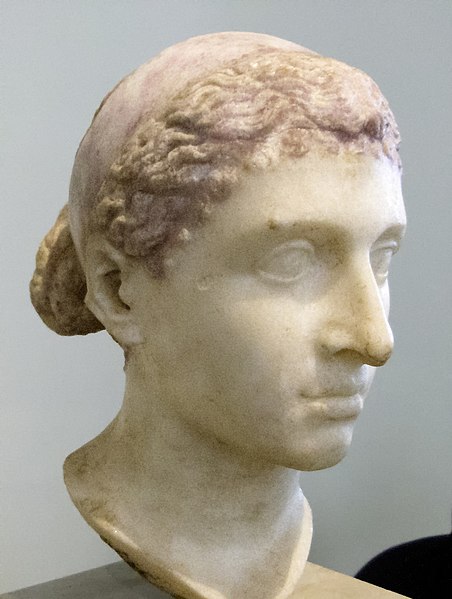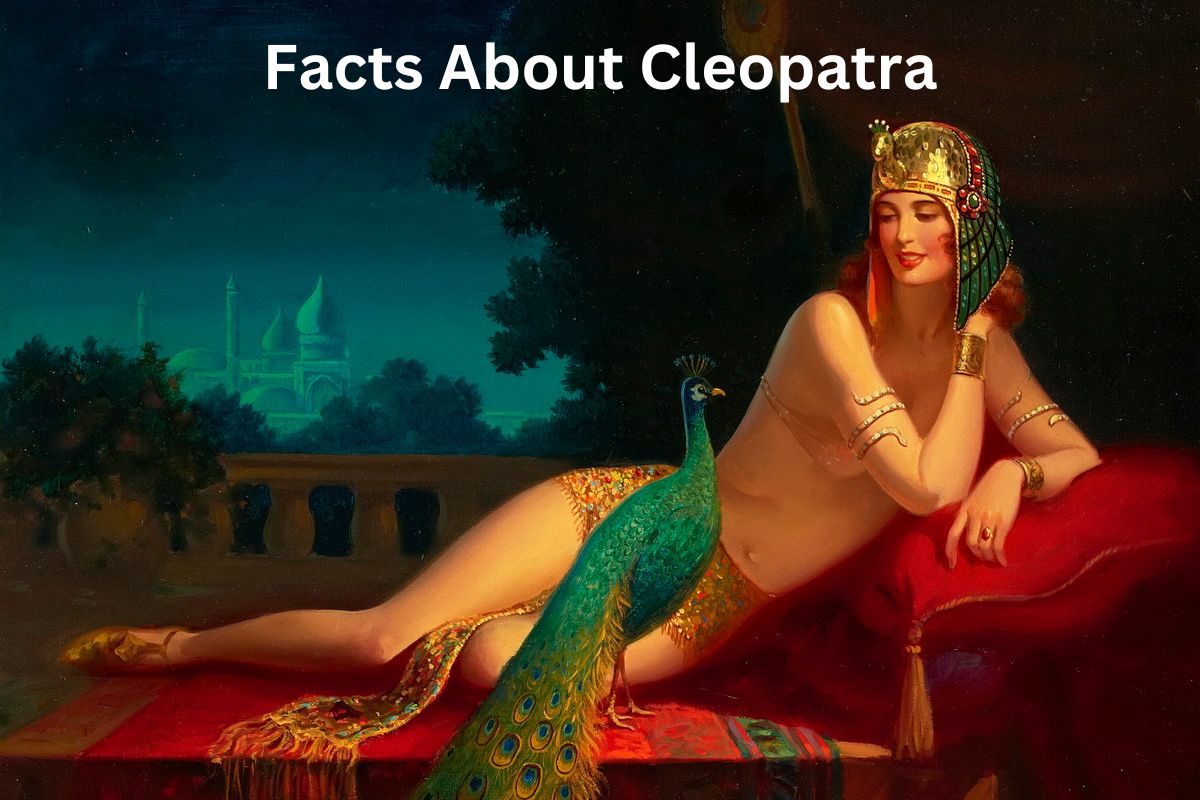Cleopatra VII Philopator, commonly known as Cleopatra, was the last active ruler of the Ptolemaic Kingdom of Egypt. Born in 69 BC in Alexandria, Egypt, she belonged to the Greek-Macedonian Ptolemaic dynasty.
Cleopatra is renowned for her intelligence, beauty, and political acumen. She spoke multiple languages and used her charm and charisma to establish alliances with influential figures of her time.
Her romantic relationships with Julius Caesar and Mark Antony played a significant role in shaping the political landscape of the Roman Republic.
Ultimately, her reign came to a dramatic end with her death in 30 BC, marking the end of the Ptolemaic dynasty and the beginning of Roman rule over Egypt. Cleopatra’s life and legacy continue to captivate the world, making her one of the most iconic figures of ancient history.
Cleopatra Facts
1. Cleopatra VII Philopator, commonly known as Cleopatra, was the last active ruler of the Ptolemaic Kingdom of Egypt
Cleopatra VII Philopator, commonly known as Cleopatra, was the last active ruler of the Ptolemaic Kingdom of Egypt. She ascended to the throne in 51 BC at the age of 18, ruling alongside her younger brother, Ptolemy XIII.
Also Read: Cleopatra Timeline
However, their relationship quickly deteriorated into a power struggle, leading Cleopatra to seek support from outside forces, such as Julius Caesar.

2. Cleopatra was born in 69 BC in Alexandria, Egypt
Cleopatra was born in 69 BC in Alexandria, Egypt. She was a member of the Ptolemaic dynasty, which was established after the death of Alexander the Great.
The Ptolemies, although Greek by origin, adopted many Egyptian traditions and presented themselves as pharaohs of Egypt. Cleopatra herself embraced Egyptian culture and was often depicted in art wearing traditional Egyptian attire.
3. Cleopatra was renowned for her beauty and intellect
Cleopatra was not only known for her beauty but also for her intellect and charisma. She was highly educated and spoke multiple languages fluently. Cleopatra was well-versed in Egyptian, the language of her subjects, as well as Greek and Latin, the languages of the ruling elite.
Her linguistic abilities enabled her to communicate with a diverse range of people and engage in diplomatic negotiations.
Cleopatra’s intelligence and charm played a significant role in her political strategy. She understood the importance of building alliances and used her charisma to influence key figures in the Roman Empire. Her ability to converse fluently with influential Romans, such as Julius Caesar and Mark Antony, helped her secure their support and gain political leverage.
Additionally, Cleopatra was known for her strategic thinking and astute political maneuvering. She actively promoted herself as the reincarnation of the Egyptian goddess Isis, establishing a divine image and strengthening her connection with the Egyptian people.
Cleopatra utilized her intellect, beauty, and cultural understanding to navigate the complex political landscape of the time and maintain her position as the ruler of Egypt.
4. Cleopatra had a romantic relationship with Julius Caesar, the Roman general and statesman
Cleopatra had a romantic relationship with Julius Caesar, the Roman general, and statesman. In 48 BC, Cleopatra visited Caesar in Rome, where she stayed in a lavish villa. It is said that she captivated Caesar with her intelligence, charm, and beauty.
Their relationship resulted in the birth of a son named Caesarion. However, their time together was cut short by Caesar’s assassination in 44 BC, which plunged Rome into chaos.
After Caesar’s death, Cleopatra returned to Egypt and faced internal conflicts with her brother, Ptolemy XIV. In order to secure her position and protect her son, Caesarion, as the rightful heir, Cleopatra turned her attention to Mark Antony, Caesar’s most trusted general and ally.

5. Cleopatra formed a political and romantic alliance with Mark Antony, which lasted for several years
Cleopatra formed a political and romantic alliance with Mark Antony, which lasted for several years. In 41 BC, Cleopatra met Antony in Tarsus, where she famously arrived on a magnificent golden barge.
It is said that she wanted to impress Antony with her grandeur and charm. Cleopatra’s tactics worked, and Antony was immediately captivated by her.
The relationship between Cleopatra and Mark Antony became deeply intertwined with both politics and romance. They had three children together: twins Cleopatra Selene II and Alexander Helios, and another son named Ptolemy Philadelphus.
Cleopatra used her association with Antony to strengthen her hold on Egypt and expand her influence in the Eastern Roman Empire.
6. Cleopatra’s relationship with Mark Antony became entangled in the power struggles of the Roman Republic
Cleopatra’s relationship with Mark Antony became entangled in the power struggles of the Roman Republic. In 31 BC, after the formation of the Second Triumvirate, a political alliance between Mark Antony, Octavian (later known as Emperor Augustus), and Lepidus, the conflict between Antony and Octavian reached its peak.
Octavian saw Antony’s association with Cleopatra as a threat to his own power. He used propaganda to paint Antony as being under the influence of a foreign queen and betraying Roman values. This led to the decisive Battle of Actium in 31 BC, where Octavian’s forces defeated those of Antony and Cleopatra.
Following their defeat at Actium, Antony and Cleopatra retreated to Alexandria. Realizing that capture by Octavian was inevitable, Cleopatra and Antony committed suicide. According to historical accounts, Cleopatra ended her life by allowing an asp, a venomous snake, to bite her.
The deaths of Cleopatra and Antony marked the end of the Ptolemaic dynasty and the beginning of Roman rule over Egypt. Egypt became a Roman province, and Cleopatra’s children with Caesar and Antony were spared but brought to Rome as captives. Their deaths effectively ended the line of the pharaohs and solidified Roman control over Egypt.
7. Fearing capture by Octavian, Cleopatra committed suicide on August 12, 30 BC
Cleopatra’s death marked the end of her tumultuous life. After the defeat at the Battle of Actium, Cleopatra and Mark Antony found themselves besieged in Alexandria by Octavian’s forces. Facing capture and the prospect of being paraded in Rome as a trophy, Cleopatra took her own life.
The details of her death vary in historical accounts, but the most popular theory is that she died by allowing an asp, an Egyptian cobra, to bite her. It is believed that she died on August 12, 30 BC.
8. Cleopatra’s death marked the end of the Ptolemaic dynasty and the beginning of the Roman era in Egypt
Cleopatra’s death signaled the end of the Ptolemaic dynasty, which had ruled Egypt for nearly three centuries since the time of Alexander the Great. With her demise, Egypt became a Roman province under the rule of Octavian (later known as Emperor Augustus).
The Roman era in Egypt brought significant changes to its governance, administration, and cultural landscape.
9. Cleopatra’s life and reign have been the subject of many works of literature, art, and film
Cleopatra’s life and reign have captivated the imagination of people for centuries, inspiring numerous works of literature, art, and film. Her story has been a subject of fascination and romanticization, often portrayed as a tale of love, power, and tragedy.
William Shakespeare’s play “Antony and Cleopatra” is one of the most famous dramatizations of their relationship, highlighting the passionate romance between Cleopatra and Mark Antony.
10. Cleopatra’s beauty and charm continue to capture the imagination of people worldwide
Cleopatra’s iconic status as a historical figure has endured throughout the centuries. She has been portrayed in countless works of art, including sculptures, paintings, and coins. Cleopatra’s beauty, intelligence, and allure continue to captivate artists and audiences alike.
However, it is important to note that much of the information about Cleopatra and her reign comes from biased Roman accounts, as the Ptolemaic records were largely destroyed. Consequently, the true extent of Cleopatra’s influence, accomplishments, and character remains a subject of debate among historians.
Nevertheless, Cleopatra’s story serves as a reminder of the complex political dynamics of the ancient world and the remarkable individuals who shaped its course.
